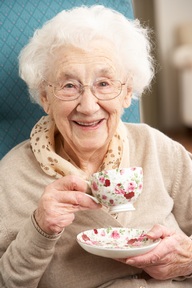Tests to identify dehydration in care homes 'do not work' and should be ditched
Standard tests used in care homes to identify dehydration in residents should be ditched, according to scientists who found they are not working.

Care workers in residential settings use simple tests to see if a person is dehydrated, which includes looking at their eyes, skin or asking them if they feel thirsty, tired or have a headache.
Researchers from the University of East Anglia (UEA) found that when a 'gold standard' blood test identified a person as being dehydrated, the simple standard tests failed to do so.
Lead researcher Dr Lee Hooper, from UEA’s Norwich Medical School, said: “Low-intake dehydration happens when people don’t drink enough fluids to stay healthy, and is very common in older people, including those living in care homes.
“It happens for all sorts of reasons, such as weakened thirst sensation - which happens as we age, not remembering to drink or difficulties fetching, carrying and reaching drinks.”
The standard tests have long been described as standard clinical indicators of dehydration and their use is advocated in nursing and medical text books, care guidelines and many health-related websites.
The research team looked at 188 men and women living in care homes in Norfolk and Suffolk. Participants underwent a number of standard dehydration tests such as looking in their mouth and feeling under their arm, having blood pressure, pulse and temperature measured, and answering questions about how they were feeling, including whether they felt thirsty or not.
They were also given a blood test to test for serum osmolality, which is the most accurate test available for measuring low-intake dehydration. The results of all the other tests were compared to this ‘gold standard’.
Lead author, Dr Diane Bunn, from UEA’s School of Health Sciences, added: “When we analysed the results of all the simple tests, we found that none of them were able to accurately identify people with dehydration, and we recommend that they are withdrawn from practice.
“Whilst blood tests are the most accurate way of telling if someone is dehydrated, this is expensive and not easily done in care homes unless a doctor orders the test. We really need an inexpensive easy-to-do test for dehydration in older people, and one which works.”
The research was funded by the National Institute for Health Research. ‘Signs and symptoms of low-intake dehydration do not work in older care home 1 residents - DRIE diagnostic accuracy study’ was published in the Journal of the American Medical Directors Association (JAMDA).
Latest News
 29-Jul-24
Dementia Bus gives carehome.co.uk staff insight into life with dementia
29-Jul-24
Dementia Bus gives carehome.co.uk staff insight into life with dementia
 01-Mar-24
Find out the top care homes in 2024
01-Mar-24
Find out the top care homes in 2024
 21-Mar-23
UK's top care homes in 2023 revealed
21-Mar-23
UK's top care homes in 2023 revealed
 03-Jan-23
carehome.co.uk launches free care helpline
03-Jan-23
carehome.co.uk launches free care helpline
 13-Dec-22
5 mins with Emily Whitehurst, chief operating officer for Constantia Healthcare
13-Dec-22
5 mins with Emily Whitehurst, chief operating officer for Constantia Healthcare